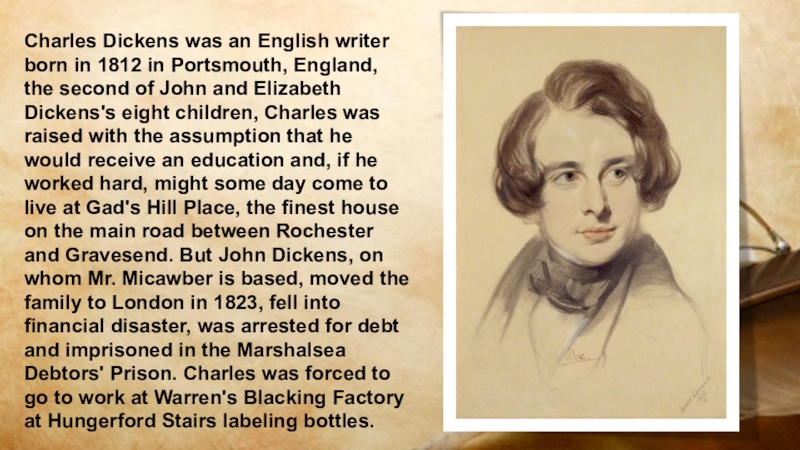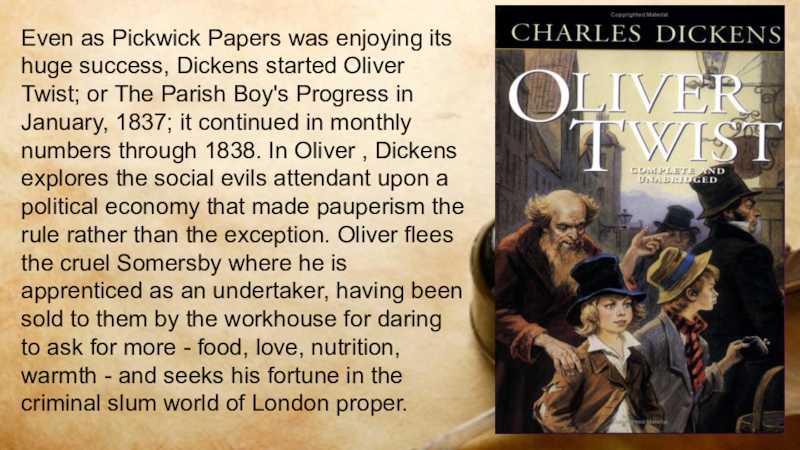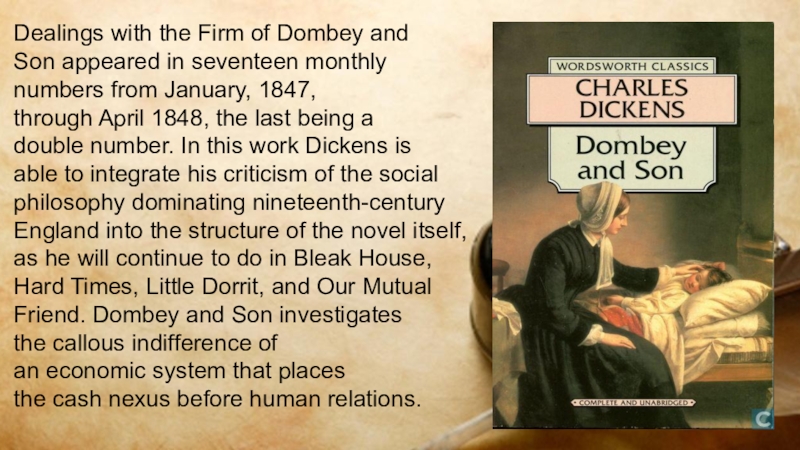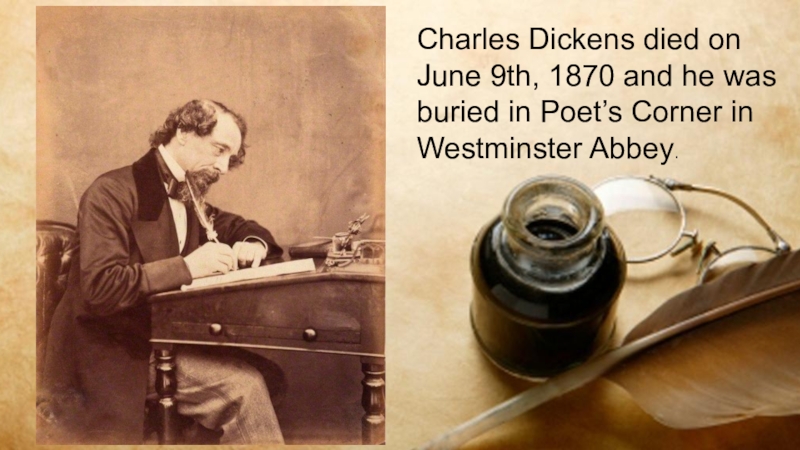- Главная
- Разное
- Образование
- Спорт
- Естествознание
- Природоведение
- Религиоведение
- Французский язык
- Черчение
- Английский язык
- Астрономия
- Алгебра
- Биология
- География
- Геометрия
- Детские презентации
- Информатика
- История
- Литература
- Математика
- Музыка
- МХК
- Немецкий язык
- ОБЖ
- Обществознание
- Окружающий мир
- Педагогика
- Русский язык
- Технология
- Физика
- Философия
- Химия
- Шаблоны, фоны, картинки для презентаций
- Экология
- Экономика
Презентация, доклад по английскому языку на тему Чарльз Диккенс: биография и творчество
Содержание
- 1. Презентация по английскому языку на тему Чарльз Диккенс: биография и творчество
- 2. Charles Dickens was an English writer born
- 3. Dickens was able to continue his education
- 4. On April 2, 1836, Dickens married Catherine
- 5. The introduction of Sam Weller into the
- 6. Even as Pickwick Papers was enjoying its
- 7. Dealings with the Firm of Dombey and
- 8. Dickens is writing the autobiographical fragment he
- 9. Over his career he wrote 15 novels,
- 10. Charles Dickens died on June 9th, 1870
Charles Dickens was an English writer born in 1812 in Portsmouth, England, the second of John and Elizabeth Dickens's eight children, Charles was raised with the assumption that he would receive an education and, if he
Слайд 2Charles Dickens was an English writer born in 1812 in Portsmouth,
England,
the second of John and Elizabeth Dickens's eight children, Charles was raised with the assumption that he would receive an education and, if he worked hard, might some day come to live at Gad's Hill Place, the finest house on the main road between Rochester and Gravesend. But John Dickens, on whom Mr. Micawber is based, moved the family to London in 1823, fell into financial disaster, was arrested for debt and imprisoned in the Marshalsea Debtors' Prison. Charles was forced to go to work at Warren's Blacking Factory at Hungerford Stairs labeling bottles.
the second of John and Elizabeth Dickens's eight children, Charles was raised with the assumption that he would receive an education and, if he worked hard, might some day come to live at Gad's Hill Place, the finest house on the main road between Rochester and Gravesend. But John Dickens, on whom Mr. Micawber is based, moved the family to London in 1823, fell into financial disaster, was arrested for debt and imprisoned in the Marshalsea Debtors' Prison. Charles was forced to go to work at Warren's Blacking Factory at Hungerford Stairs labeling bottles.
Слайд 3Dickens was able to continue his education after his father received
a legacy from a relative and was released from the Marshalsea. Charles attended Wellington House Academy from 1824 to 1826 before taking work as a clerk in Gray's Inn for two years. In order to qualify himself to become a newspaper parliamentary reporter.
Dickens's first published piece appeared in the December, 1833, number of the Monthly Magazine , followed by nine others, the last two appearing over the signature "Boz," a pseudonym Dickens adopted from a pet name for his younger brother.
Dickens's first published piece appeared in the December, 1833, number of the Monthly Magazine , followed by nine others, the last two appearing over the signature "Boz," a pseudonym Dickens adopted from a pet name for his younger brother.
Слайд 4On April 2, 1836, Dickens married
Catherine Hogarth, daughter
of George
Hogarth, with whom Dickens
worked
on the Morning Chronicle.
Catherine and
Charles had ten children
before they separated in 1858.
Слайд 5The introduction of Sam Weller into the fourth number of Pickwick
Papers (1836-37) launched the most popular literary career in the history of the language. Pickwick Papers became a publishing phenomenon, selling forty thousand copies of every issue. Published in twenty monthly installments, Pickwick took England by storm: Judges read it on the bench, doctors in the carriages between visiting patients, boys on the street.
Слайд 6Even as Pickwick Papers was enjoying its huge success, Dickens started
Oliver Twist; or The Parish Boy's Progress in January, 1837; it continued in monthly numbers through 1838. In Oliver , Dickens explores the social evils attendant upon a political economy that made pauperism the rule rather than the exception. Oliver flees the cruel Somersby where he is apprenticed as an undertaker, having been sold to them by the workhouse for daring to ask for more - food, love, nutrition, warmth - and seeks his fortune in the criminal slum world of London proper.
Слайд 7Dealings with the Firm of Dombey and
Son appeared in seventeen
monthly
numbers from January, 1847,
through April 1848, the last being a
double number. In this work Dickens is
able to integrate his criticism of the social
philosophy dominating nineteenth-century
England into the structure of the novel itself,
as he will continue to do in Bleak House,
Hard Times, Little Dorrit, and Our Mutual
Friend. Dombey and Son investigates
the callous indifference of
an economic system that places
the cash nexus before human relations.
numbers from January, 1847,
through April 1848, the last being a
double number. In this work Dickens is
able to integrate his criticism of the social
philosophy dominating nineteenth-century
England into the structure of the novel itself,
as he will continue to do in Bleak House,
Hard Times, Little Dorrit, and Our Mutual
Friend. Dombey and Son investigates
the callous indifference of
an economic system that places
the cash nexus before human relations.
Слайд 8Dickens is writing the autobiographical fragment he shares with Forster and
which he mined for his most autobiographical novel, The Personal History of David Copperfield, published in twenty monthly installments from May 1849, to November 1850, the last issue being a double number. David Copperfield opens with David, the narrator, indicating that the pages of his book must show whether he will turn out to be the hero of his own life.
Слайд 9Over his career he wrote 15 novels, 5 novellas, hundreds of
short stories and non-fiction articles. He also worked for 20 years as an editor in a weekly journal.
Слайд 10Charles Dickens died on June 9th, 1870 and he was buried
in Poet’s Corner in Westminster Abbey.















